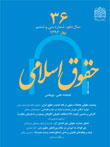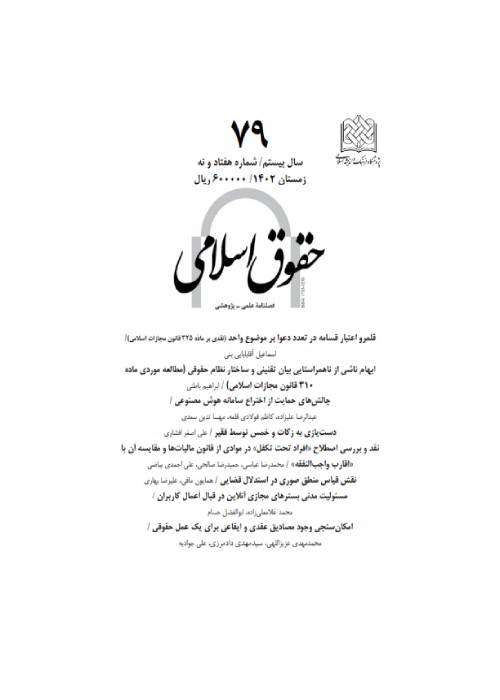فهرست مطالب

فصلنامه حقوق اسلامی
سال دهم شماره 1 (پیاپی 36، بهار 1392)
- بهای روی جلد: 60,000ريال
- تاریخ انتشار: 1392/02/15
- تعداد عناوین: 6
-
-
صفحه 97
-
Page 7Unreasonable (Safahi) transactions are in a position to be done bySafih (fool dealer) but here the dealer is not really a Safih. Rahter he has perfection of concious, reason and will and is free from any coercion insigning the contract. These deals have instances and rules the understanding of which requires knowledge of their nature and the method to recognize them. Unreasonable transactions (Safahi) are not related to detrimental contracts and in all contracts and even conditionals and unilateral transactions (Iqaat) can be seen. The best criterion to distinguish these transactions is investigating the motive of the transaction. The lack of rational motive behind a deal makes the transaction an unreasonable transaction (Safahi). For the recognition of rational motive one must refer to the customary practice. The legal status of these transactions is disputed among Imami scholars and jurists. Some believe these transactions are valid and some believe in their voidness and both have evidence being criticized by the other party. These transactions are valid, here we will argue considering Iranian legal system, because of having necessary elements of contracts.Keywords: Contract, Unreasonable Person (Safih), Unreasonable (Safahi) transactions, Detriment (Gharar)
-
Page 37It is unjust to absolutely accept or deny criminal’s responsibility for damages following a murder or injury. Therefore, cases should be distinguished according to the relationship between damages and thebodily harm. The criminal may be responsible for damages occurring besides and independent of the injury. This is also the case when damages are caused indirectly by the injury, since there are multiple subjects to losses. This is so even when damages are equal to bloodwit or more. But if the crime is only a condition for the damage to take effect and also if the crime is associated with damage, the criminal is not responsible for damages and may only be sentenced to retaliation (Qisas) and bloodwit (Diya).Keywords: Compensation for Damages, Retaliation (Qisas), Bloodwit (Diya), Cause
-
Page 65From a legal viewpoint, there are different mechanisms for ensuring the quality of goods. The first step is making use of the capacity of contract of sale in order to provide buyer’s rights, to ensure quality of the object of sale, its compliance with the expectations of the buyer and develop sanctions. Hence, legal systems, by adopting a supportive approach towards consumer contracts of sale, have promoted the standards of quality and by shifting the burden of proof completed their support of the consumer. Guarantee is another legal mechanism for product quality assurance. Both legal (mandatory) & commercial (voluntary) guarantees are binding and include additional obligations for seller or supplier. Here, we study the nature of guarantee, its validity and effectiveness are analyzed in any of the legal forms of stipulation, unilateral undertaking and independent contracts, considering two features of probability and unknown amount of guarantor’s obligations. In the latter form, different options are considered to describe the contractual nature of guarantee.Keywords: Quality, Quality Assurance, Goods, Guarantee, Nature of Guarantee
-
Page 97The author of a literary and artistic work has two categories of rights, each of which has its own characteristics. Meanwhile, protecting disclosure right has faced with different views in legal systems. Also, protecting disclosure right in Iranian legal system has created doubts due to legal evidence banning the speculation and Fiqh arguments on the necessity of publishing knowledge and this makes further investigation necessary. Effective legal protection of disclosure right requires preventing Infringement of the right and providing adequate compensation for damages. This right is violated either alone or with other rights such as right of confidentiality, first publication right, right to display and distribution right some of which being the author's economic rights. This paper is going to discuss different assumptions regarding these Infringements.Keywords: Disclosure Right, Speculation, Infringement, Confidentiality Right, Economic Right of First Publication, Right to Display, Right to Distribute
-
Page 115The Child’s right to education is enshrined in various international human rights instruments such as ICCPR, ICESCR and CRC. The state obligations in the realization of the right to education and the rights andobligations of parents to the child on on this right, is discussed in these instruments and the relevant interpretations. This right is regarded as a transversal right having many individual, social and collective dimensions. Children, their parents and educational institutions are holders of this rightand the state, parents and international community as a whole are respective duty-bearers. These complicated aspects of the right have madeit very controversial both in theory and in practice. This paper, investigates international standards governing the right and the challenges to it. For this purpose, we firstly study the definition and legal nature of the right to education as a human right. Then, the content of the right and respective roles of the state, parents and teachers in determining its content, and finally, performance of the right and relative principles and parent involvement in the school governance are discussed.Keywords: Human Rights, Child's Rights, Right to Education, Compulsory Education, Free Education
-
Page 147The validity of custom due to Iranian criminal law system is regarded as one of the guidance sources. Notwithstanding the fact that custom can just inspire the legislator and cannot be independently referred to in criminalization, considering the principle of legality in criminal law, after accepting the statute system in Iran, custom became important in recognition of the legal concepts and inference of rules of criminal law from criminal texts. Because the assumption of the legislator is that laws are codified in the customary language, custom found an important role in this regard. The custom is also a unique source of criminal law in the recognition of some parts of triple elements of crime. In this paper, the effect of custom on the recognition of legal and material elements of crime is discussed in detail and also the obligatoriness of this source is argued.Keywords: Custom, Legal Element, Material Element, Interpretation of Law, Concepts of Law


